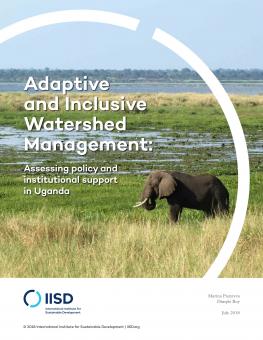
Adaptive and Inclusive Watershed Management: Assessing policy and institutional support in Uganda
This report looks at how Uganda’s various institutions and policies incorporate climate change and gender considerations into planning, budgeting and monitoring in the water sector.
This report explores existing institutional linkages between gender, water and climate change in Uganda.
Climate change is affecting water quantity and quality in Uganda and is an emerging major threat to health and well-being in the country. In addition to climate change impacts, a rapid population growth rate is anticipated to sharply increase demands for water and create challenges for the country in achieving its development goals.
At the same time women who are the main users of water for household and small-scale agriculture, have limited access to resources - land, credit, education, control over household income - needed to effectively adapt to climate change impacts and are affected the most when water catchments are degraded.
Responding to these challenges, Uganda is showing leadership in its policy and institutional systems in relation to climate and gender mainstreaming in water management. A number of policies and institutions consider gender equality and climate change in planning, budgeting and monitoring activities at various levels.
This research is the result of a desk review of policies, plans and strategies and interviews with key informants from Uganda’s water sector institutions and institutions working on issues of gender and climate change. These included officials involved in gender mainstreaming from the Ministry of Water and Environment, and experts involved at local, national and international level planning on these issues.
See our similar analysis on Kenya.
Participating experts
You might also be interested in
Adaptive and Inclusive Watershed Management: Assessing policy and institutional support in Kenya
This report explores existing institutional linkages between gender, water and climate change in Kenya.
IISD Annual Report 2023–2024
While IISD's reputation as a convenor, a trusted thought leader, and a go-to source on key issues within the sustainable development field is stronger than ever, the work happening outside the spotlight is just as valuable.
How to Make Nature-Based Solutions for Adaptation Work for Everyone
Effective nature-based solutions (NbS) for adaptation start with integrated climate risk assessments. These take-aways will help practitioners plan for inclusive and sustainable NbS.
Why Public Policy Matters When It Comes to Gender Equality
Cold statistics on gender equality in government reveal only part of the story; the cultures and processes behind the stats can teach us much more about where we are headed.